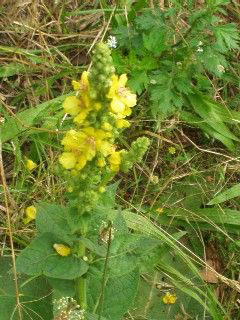Human Flower Project
P60
By on February 28th, 2022 in
Medicine
Monday, November 15, 2004
Poppies—Not Just for Painkilling Anymore
An Australian research team has genetically engineered a strain of poppies, tricking them to produce, not narcotics, but raw materials for other kinds of drugs.
The Washington Post notes recent work in the bioenginnering of opium poppies.
Poppies naturally make morphine and codeine; “because their chemical structures are so difficult to copy in the laboratory, they are still derived from the flowers, grown in vast pharmaceutical company fields.”
But Australian scientists, by tinkering with and retarding the poppy’s natural production of narcotics, have induced the flowers to build up another chemical substance—(S)-reticuline—that has “shown promise for a number of conditions ranging from baldness to malaria.”
Wednesday, November 10, 2004
Mullein ~ Horehound, Tag Team for Cold Season
Floral remedies beat the antibiotic gobble.
Mainstream media and even the needles-and-pills crowd are recommending herbal remedies now.
And two flowers long popular for allaying cold symptoms warrant a mention, since we in the Northern Hemisphere are headed for winter.
 Mullein (Verbascum thapsus)
Mullein (Verbascum thapsus)
Photo: sacredearth.com
Mullein grows into tall spikes, smaller than hollyhock but bigger than delphinium, and derserves a spot in the garden. Its leaves, roots and flowers too have served lots of medicinal purposes since ancient times, but for colds in particular it’s used to soothe the throat and loosen congestion. Horehound (not recommended during pregnancy) can suppress a cough.
There are loads of sites out there about herbalism (please recommend the best ones that feature flowers). Two I like are Sacred Earth, covering lots of ethnobotany issues, and EZ Herbs, Ellen Zimmermann’s compendium of remedies.
Sunday, November 07, 2004
Ethiopia’s Elite Reclaim Folk Remedy
Ethiopian scientists advocate more testing and conservation of an age-old soothing herb.
The Addis Tribune and other Ethiopian newspapers report an upsurge of scientic interest in dingetenga (Taverniera abyssinica) and concern that the flowering plant, used for generations, may now be engandered.
Dingetenga, a legume that grows only in Ethiopia, is a common herbal remedy widely sold in the Addis Ababa maket as a cure for sudden onset stomach cramps and fever. “A single dose of tied-up roots sells for about one birr. The roots are chewed, and the juice swallowed.” Botanist Helmut Koos began scientific documentation of the herb’s medicinal uses in the late 1970s. More recently, Ethiopians scientists have begun to analyze dingetenga’s chemical make-up and clinically proven its benefits. But as so often happens, this official seal of approval comes as the plant is about to disappear from its native habitat.
Today’s Tribune editorial stresses that “conservation, cultivation, and development considerations need to go hand in hand in order to promote judicious use of medicinal plants.”
Wednesday, October 06, 2004
Science Catches Up with Hibiscus
A university study shows what Asian and Latin American healers already knew: hibiscus protects hearts.
The Journal of the Science of Food and Agriculture has published research findings from Chung Shan Medical University in Taiwan that show hibiscus flowers—like red wine and tea—contain heart-cleansing antioxidants. Called jamaica in these parts, hibiscus has long been a favored herbal remedy for high blood pressure. Odd how the cures that people who can’t afford pills have used for centuries only become credible when they’re good for lab rats.
Here in sweltering Austin, Texas, iced hibiscus tea is on the beverage menu at most restaurants. It’s almost too ruby beautiful to drink. Now knowing that hibiscus can prevent the heart valves from clogging with fat, it’s even more delicious.
My favorite is Nile Valley Herbs hibiscus mint tea (nilevalleyherbs.com). Part of the proceeds from tea sales benefits the company owner’s hometown, a village in the Sudan.

